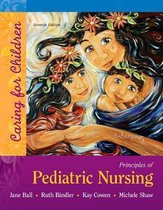Test bank
R
Principles of Pediatric Nursing: Caring for
Children
U
Marcia London (Author), Patricia Ladewig (Author), Michele Davidson
E
7th Edition
S S
I
O
N
N
O
C
E D
,Test Bank: Principles Of Pediatric Nursing 7th Edition By Jane W Ball, Ruth C Bindler, Kay
Cowen
CHAPTER 1 NURSE'S ROLE IN CARE OF THE CHILD: HOSPITAL, COMMUNITY AND
HOME
R
1) Which nursing role is not directly involved when providing family-
centered approach tothe pediatric population?
1. Advocacy
U
2. Case management
3. Patient education
4. Rese
E
archer
Answer
:
S
4
Explanation: 1. A researcher is not involved in the family-centered approach to patient
S
care ofchildren and their families. Advocacy, case management, and patient education
are all roles directly involved in the care of children and their families.
I
2. A researcher is not involved in the family-centered approach to patient care of
children andtheir families. Advocacy, case management, and patient education are all
O
roles directly involved in the care of children and their families.
3. A researcher is not involved in the family-centered approach to patient care of
children andtheir families. Advocacy, case management, and patient education are all
N
roles directly involved in the care of children and their families.
4. A researcher is not involved in the family-centered approach to patient care of
children andtheir families. Advocacy, case management, and patient education are all
N
roles directly involved in the care of children and their families.
Page Ref: 4
O
Cognitive Level: Analyzing
Client Need &Sub: Safe and Effective Care Environment: Management of Care
C
Standards: QSEN Competencies: Patient-centered care | AACN Essential
Competencies:
Essential II: Basic organizational and systems leadership for quality care and patient
D
safety |NLN Competencies: Professional identity | Nursing/Integrated Concepts: Nursing
Process: Assessment/Coordination of care
E
Learning Outcome: LO 1.2 Compare the roles of nurses in child
healthcare.MNL LO: Family-centered care
Med C
, 2) A nurse is working with pediatric clients in a research facility. The nurse recognizes that
federal guidelines are in place that delineate which pediatrics clients must give assent for
R
participation in research trials. Based upon the client's age, the nurse would seek assent
from which children?
Select all that apply.
U
1. The precocious 4-year-old commencing as a cystic fibrosis research-study participant.
2. The 7-year-old leukemia client electing to receive a newly developed medication, now
E
being researched.
3. The 10-year-old commencing in an investigative study for clients with precocious puberty.
4. The 13-year-old client commencing participation in a research program for Attention
S
Deficit Hyperactivity Disorder (ADHD) treatments.
Answer: 2, 3, 4
S
Explanation: 1. Federal guidelines mandate that research participants 7 years old and older must
receive developmentally appropriate information about healthcare procedures and treatments and
give assent.
I
O
2. Federal guidelines mandate that research participants 7 years old and older must receive
developmentally appropriate information about healthcare procedures and treatments and
give assent.
N
3. Federal guidelines mandate that research participants 7 years old and older must receive
developmentally appropriate information about healthcare procedures and treatments and
give assent.
N
4. Federal guidelines mandate that research participants 7 years old and older must receive
developmentally appropriate information about healthcare procedures and treatments and
give assent.
O
Page Ref: 11, 12
Cognitive Level: Applying
C
Client Need &Sub: Psychosocial Integrity
Standards: QSEN Competencies: Patient-centered care | AACN Essential Competencies:
D
Essential V: Healthcare policy, finance, and regulatory environments | NLN Competencies:
Nursing judgement | Nursing/Integrated Concepts: Nursing Process: Planning/Coordination of
care
E
Learning Outcome: LO 1.6 Examine three unique pediatric legal and ethical issues in pediatric
nursing practice.
MNL LO: Developmentally appropriate care
Med C
, 3) The nurse in a pediatric acute care unit is assigned the following tasks. Which task is not
appropriate for the nurse to complete?
R
1. Diagnose an 8-year-old with acute otitis media and prescribe an antibiotic.
2. Listen to the concerns of an adolescent about being out of school for a lengthy
U
surgical recovery.
3. Provide information to a mother of a newly diagnosed 4-year-old diabetic about local
support- group options.
E
4. Diagnose a 6-year-old with Diversional Activity Deficit related to placement in
isolation. Answer: 1
Explanation: 1. The role of the pediatric nurse includes providing nursing assessment, directing
S
nursing care interventions, and educating client and family at developmentally appropriate
levels; client advocacy, case management, minimization of distress, and enhancement of coping.
S
Advanced practice nurse practitioners perform assessment, diagnosis, and management of health
conditions.
2. The role of the pediatric nurse includes providing nursing assessment, directing nursing
I
care interventions, and educating client and family at developmentally appropriate levels;
O
client advocacy, case management, minimization of distress, and enhancement of coping.
Advanced practice nurse practitioners perform assessment, diagnosis, and management of
health conditions.
N
3. The role of the pediatric nurse includes providing nursing assessment, directing nursing
care interventions, and educating client and family at developmentally appropriate levels;
client advocacy, case management, minimization of distress, and enhancement of coping.
N
Advanced practice nurse practitioners perform assessment, diagnosis, and management of
health conditions.
4. The role of the pediatric nurse includes providing nursing assessment, directing nursing
O
care interventions, and educating client and family at developmentally appropriate levels;
client advocacy, case management, minimization of distress, and enhancement of coping.
Advanced practice nurse practitioners perform assessment, diagnosis, and management of
C
health conditions.
Page Ref: 2-4
D
Cognitive Level: Applying
Client Need &Sub: Safe and Effective Care Environment: Management of Care
Standards: QSEN Competencies: Patient-centered care | AACN Essential Competencies:
E
Essential II: Basic organizational and systems leadership for quality care and patient safety |
NLN Competencies: Professional identity | Nursing/Integrated Concepts: Nursing Process:
Implementation/Coordination of care
Learning Outcome: LO 1.2 Compare the roles of nurses in child healthcare.
MNL LO: Pediatric nursing care
Med C





